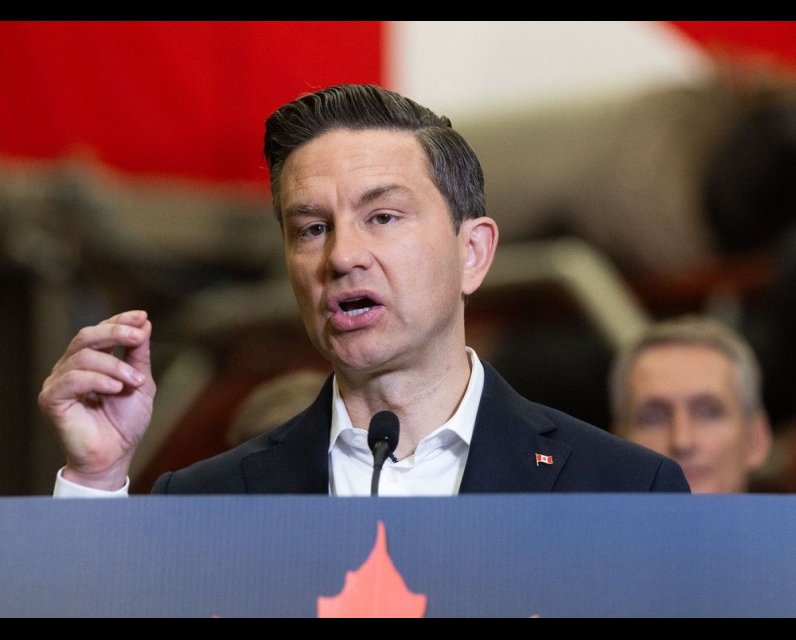Poilievre calls on Carney to get 'shovels in the ground' on two pipelines by next March

OTTAWA — Conservative Leader Pierre Poilievre is calling on Prime Minister Mark Carney to get “shovels in the ground” on at least two pipelines within one year of him assuming office.
The call comes weeks after the passage of Carney’s first major piece of legislation, the bill known as the “One Canadian Economy,” which introduces a new process to streamline the approvals for major infrastructure projects.
“Now you might say, this is too ambitious, how could you possibly get a pipeline under construction in mere months?” Poilievre told reporters at a press conference in Calgary.
“Well, he’s been in office already since last March, and he said, and I quote, ‘we need to think big and act bigger. We need to do things previously thought impossible possible at speeds we haven’t seen in generations’,” Poiievre said, referring to past comments made by Carney.
“I couldn’t agree more,” added Poilievre.
Carney’s commitment to fast-tracking approvals for major projects is a signature pledge he made to boost Canada’s economy in the face of economic threats from U.S. President Donald Trump, who has unleashed global tariffs, including on Canadian goods.
Last week, the president increased the tariff rate to 35 percent, up from its previous 25 percent, on a broad range of Canadian goods. But with the White House granting exemptions for products that comply with the free-trade agreement Canada has with the U.S. and Mexico, that creates a carveout for most Canadian goods.
U.S tariffs of 50 per cent remain in place on Canadian steel and aluminum, as well as on the automotive sector to the tune of 25 per cent, should products not comply with the free trade agreement.
Poilievre, whose Conservatives lost the April 28 federal election to Carney’s Liberals, said on Thursday that the prime minister has “broken his promise” to secure a deal with Trump, despite running a campaign touting his abilities to handle the unpredictable U.S. president.
Trump’s latest increase in tariffs on Canada came as both sides failed to reach a deal by Aug. 1, which was the second and latest deadline Canadian officials were working towards, after first having set a deadline to reach an agreement by July 21.
Carney has said negotiations with the U.S would continue, as he now faces differing calls from some premiers as to whether he should retaliate by increasing Canada’s counter-tariffs on U.S. steel and aluminum to 50 per cent, up from its current 25 per cent.
While Ontario Premier Doug Ford has said Carney should forge ahead with a new round of retaliation, Saskatchewan Premier Scott Moe has said Canada should lift its countermeasures to strike a deal with the U.S.
Poilievre on Thursday reiterated that Conservatives believe Canada should target its countermeasures on American products that exert maximum pressure on the U.S. but have as minimal little impact as possible on Canadian companies.
Aiming at Carney’s promise to get more major projects built, Poilievre called for the prime minister to see that construction is underway on two pipelines, a new liquified natural gas project, and a road to the mineral-rich region of northern Ontario, known as the Ring of Fire, by March 14, 2026.
That date coincides with the first anniversary of Carney being sworn in as prime minister, after winning the Liberal leadership race.
“We need shovels in the ground, and we need deadlines to make those shovels dig and get things done.”
He said Carney can make that happen while also upholding the federal government’s obligation to consult with First Nations under section 35 of the Constitution.
As Poilievre spoke, Carney was attending a meeting with Metis leaders gathered in Ottawa to provide their feedback and raise concerns about the government’s ambitions for getting more major projects built.
It was the third such session the prime minister has held with Indigenous-rights holders, following earlier meetings he had with Inuit and First Nations leaders.
Some First Nations leaders have voiced major opposition to his plan to fast-track major projects, saying Carney rushed the passage of the bill with little time to provide input and without assurances that their treaty rights and rights to be consulted would be respected.
Carney has pledged consultations and told a meeting of First Nations leaders last month that his plan provides a major opportunity to create jobs and advance economic reconciliation with Indigenous leaders.
The federal government has yet to name the first projects that will qualify for the faster approvals process.
National Post
Our website is the place for the latest breaking news, exclusive scoops, longreads and provocative commentary. Please bookmark nationalpost.com and sign up for our politics newsletter, First Reading, here.



Comments
Be the first to comment